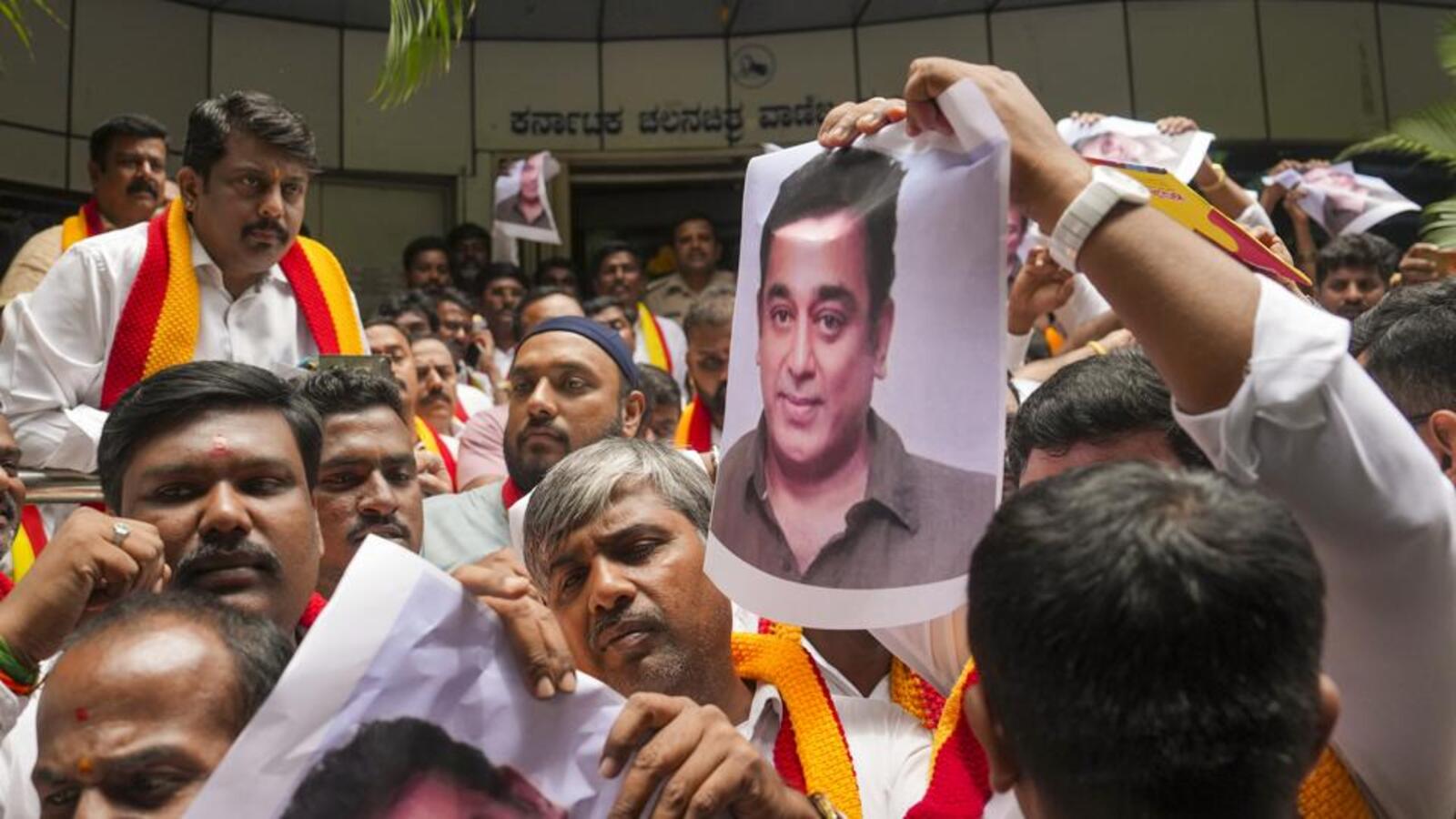
SC hits out at ‘mob rule’ after Karnataka bans ‘Thug Life’ movie
How did your country report this? Share your view in the comments.
Diverging Reports Breakdown
SC hits out at ‘mob rule’ after Karnataka bans ‘Thug Life’ movie
Kamal Haasan’s film Thug Life was not being screened in Karnataka. Several protests were held in Bengaluru against actor Haasan for his remarks on the Kannada language. Supreme Court on Tuesday asserted that no one can prevent the release of a film certified by the Central Board of Film Certification (CBFC) A bench of justices Ujjal Bhuyan and Manmohan termed the so-called ban on release of the film in cinema halls and multiplexes across Karnataka as illegal. They said it was triggered by threats of violence from “mobs and vigilante groups.” The court also questioned the Karnataka high court’s directive suggesting that Haasan apologise for his remark comparing the Tamil and Kannataka languages, made during a public event. The bench was categorical, “It is not the business of the court to seek apology from anybody just because he’s expressed a view,” it said. “The rule of law demands that any person must be allowed to release his film. Filmmakers cannot suffer the bane or fear that cinemas would be burnt down for showing the film,’ it added.
A bench of justices Ujjal Bhuyan and Manmohan termed the so-called ban on the release of the film in cinema halls and multiplexes across Karnataka as illegal, stating it was triggered by threats of violence from “mobs and vigilante groups.”
“Mobs and vigilante groups cannot be permitted to have their way and the rule of law must always prevail,” the top court said.
Slamming the disruption caused by the threats of arson and communal incitement, the bench observed, “The so-called ban under threat of violence stems not from any lawful process but from a deliberate campaign of terror, including explicit threat of arson against cinema halls, incitement of large-scale violence targeting linguistic minorities…We can’t allow mobs and vigilante groups to take over the streets. The rule of law must prevail. We can’t allow this to happen.”
The court also questioned the Karnataka high court’s directive suggesting that Haasan apologise for his remarks comparing the Tamil and Kannada languages, made during a public event. The bench was categorical, “It is not the business of the court to seek apology from anybody just because he’s expressed a view.”
Taking exception to the notion that Haasan had voluntarily withheld the release of his film in the state, the court told Karnataka government counsel DL Chidananda that the matter was larger than one actor or one film. “See, this is not just about a film. This concerns the rule of law and fundamental rights. That is why the Supreme Court is intervening. We are the custodians of these rights,” it said.
The court also transferred Haasan’s pending petition before the Karnataka high court, seeking police protection for the film’s release, to itself and directed the state to file a counter affidavit by June 19.
The proceedings arose out of a petition filed by an individual named Mahesh Reddy, who urged the court to direct the state to permit public screening of the film. Reddy told the apex court he was compelled to approach it after the high court “chose to prioritise appeasement over the rights of the filmmakers.”
At this, the bench commented: “The rule of law demands that any person must be allowed to release his film. Filmmakers cannot suffer the bane or fear that cinemas would be burnt down for showing the film. People may not come or watch the film. We are not passing an order that people must watch it. But the film must be shown.”
The court cited its recent ruling in Imran Pratapgarhi vs State of Gujarat, where it quashed an FIR against the Rajya Sabha MP for sharing a poem on social media. It also referred to the 2001 Bombay high court judgment, lifting the state-imposed ban on the Marathi play Me Nathuram Godse Boltoy.
“There were critical references to the Father of the Nation (in the play)… But that alone is not reason enough to prevent a performance. Freedom of expression must be protected,” the bench said.
Addressing the backlash against Haasan, the court noted that even if his statements were objectionable, violent retaliation was unjustified.
“Let there be debate. Let the enlightened people of Bengaluru say he (Haasan) is wrong. But there cannot be resort to threats and violence,” it remarked.
Reiterating its position, the bench concluded: “Rule of law is important. If anyone wants to show a film, it must be released after it has got CBFC’s certificate. It has a certificate, it is liable to be screened. That is the law we follow in this country.”
The controversy began last month after Haasan, at a music launch for his film, remarked that Kannada had originated from Tamil. The comment sparked outrage, with many accusing him of insulting the Kannada language and its heritage. Haasan later clarified that he had no intention of offending anyone and expressed deep respect for Karnataka and the Kannada language.
Earlier this month, the High Court had sharply criticised Haasan’s stance and questioned the absence of a simple apology that could have “defused the situation.”
“Discretion is the better part of valour,” Justice M Nagaprasanna had said, echoing Shakespeare to press the actor to show humility.
“You are not an ordinary man. You are a public figure. You create a circumstance, you cause unrest, and now you want protection from the state machinery. This entire situation could have been solved with a simple apology,” the high court had said.
